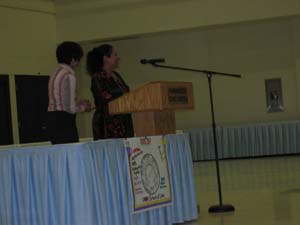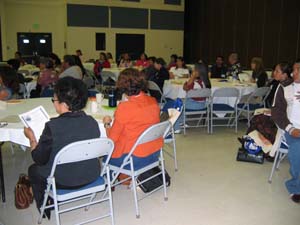Coal miners discuss
how to fight discrimination
Changing Woman Conference draws
miners from five Western states
(front page)
 
|
Militant/Teri Moss
|
Lisa Kennedy (at mike), a miner and member of International Union of Operating Engineers Local 953, and University of New Mexico Law School student Amber Creel moderated the April 18 Changing Woman Conference. Right, conference participants.
|
BY DANIELLE LONDON
AND BETSY FARLEY
FARMINGTON, New Mexico—“There are 22 women out of 228 miners working underground at BHP. This conference is baby steps to something that can be bigger,” said Lisa Kennedy, 36, an underground coal miner and member of the International Union of Operating Engineers (IUOE) Local 953 at the BHP-owned San Juan mine near here. “It unites us back to the basics of brother and sisterhood, to discuss problems out.” Kennedy was one of the moderators of the April 18 Changing Woman Conference.
Billed as a gathering to “teach, strengthen, encourage and inform working women, particularly those working in non-traditional fields,” the conference, which was sponsored by IUOE Local 953 and the University of New Mexico (UNM) School of Law, drew about 50 people. It was stamped by the large turnout of women who work in the region’s coal mines and the struggles in the region to expand and strengthen the unionization of the mines.
IUOE Local 953 organizes miners at three surface mines and one underground mine located on the New Mexico side of the Four Corners area of the Navajo Nation. Ninety percent of the miners there are Navajo. The conference also drew miners from Arizona, Colorado, Wyoming, and Utah. Four miners from the Co-Op mine in Huntington, Utah, participated in the conference and they were invited to speak during a lunchtime session about their more than 17-month battle for union representation.
“It was a success. Everybody walked away with more information,” said Rosie Kellywood, a heavy equipment operator on the surface at BHP for 12 years. “We learned more about each other and that’s just what we were hoping for.” Kellywood was one of the miners who initiated the idea for the conference and was one of its main organizers. “This is just the beginning,” she said. “The people want to do it again even stronger,”
Discrimination in the mines
In the different workshops and in informal discussions, workers participating in the conference told stories about their experiences with discrimination and harassment on the job and the steps they took in many cases to join with co-workers and the union to defend their rights.
Lorena Anderson, a worker at BHP mines for 30 years, described in a workshop on sexual harassment how she worked with the union to beat back an effort by a bosses to drive her out of the mine. She said a supervisor had been constantly demeaning her by yelling and swearing at her in the office and in front of co-workers, and retaliating against her when she raised safety questions. She said by working through the union she was able to force the company to back off.
Participants described the fight to hold jobs and learn new skills in the face of harassment.
“I have co-workers, the guys, who have stuck up for me. I’ve earned their respect because I can do the same job they do and even outwork them,” said a 28-year-old Navajo coal miner attending the conference, who asked that her name not be used. “I had a foreman that yelled at me and said women shouldn’t be in the mine and I went to the union. The union rep and I met with the supervisor and he backed off and started being nice to me.”
This miner described a weight-lifting test she was forced to undergo in order to be hired. In the process, she said, she was made to lift 110 lbs over her head. The mine bosses have long used such tests to discriminate against women and older workers and to reinforce unsafe conditions in the mines. Other miners also described their experiences with these tests.
Having worked at the mine for three years, she has worked in a number of jobs that bosses try to make it harder for women to do, including construction, longwall, roof bolting, and on crews that run the large continuous mining machines. “A lot of co-workers show me how to do things even though supervisors don’t want to show me,” she said.
“We are fighting for the future so women coming into the workforce don’t have to face what I faced,” said Rose Benally, who worked at BHP for 26 years and now works in plant operations. “I’ve always got help from the union. I feel I’ve got extra protection being union. Union brothers and sisters should support each other. The lead man was picking on me but they backed off because they see I won’t put up with it. Word will get around that I’ve been to this conference. They’ll think ‘she does mean business,” she said. “It is important for men to be here too.”
“A few of the guys at BHP supported this conference and are here,” said Norman Dave Benally, a heavy equipment operator on a BHP surface mine who attended the conference. “At first the conference was for women but we’re trying to change the thinking among spouses and family members.”
Benally mentioned the importance of the 12-day strike that IUOE Local 953 carried out in February 2004. “We feel we’re more secure having a union after last year’s strike even though the problems we had were not totally resolved,” he said. The union won a wage increase three times higher than the company’s original offer and a raise in the allowance for Navajo traditional medicine.
“Part of the reason for organizing this conference is to make women aware they can stand up, they do have rights,” Wars Peterman, president of IUOE Local 953 and an underground miner at the BHP San Juan mine, told the Militant. “How many women continuous miner operators do we have? How many shear operators? Women are limited to certain jobs and we have to fight this. A woman can run any equipment a man can. But some foreman come right out and say that women don’t belong underground. It’s really good when women can stand up.”
Battle by Co-Op miners
The battle by miners at the Co-Op mine was well-received by the conference participants. Co-Op miners Berthila Leon and Alyson Kennedy were invited to speak at the lunch time session and the miners information table was a hub of discussion on how to extend solidarity with this union-organizing fight.
We thank you for inviting us,” Leon told the crowd. “We are fighting for a union.” Leon worked at the Co-Op mine for six years prior to the strike.
“In the Price, Utah, area only two of 10 mines are union. We’ve been battling since 2003 when we were fired for trying to organize a union,” said Kennedy.
After winning their jobs back following a 10-month strike, Kennedy explained, “the company fired the workers again right before the union election. They claimed workers did not have proper work documents but it’s because we are fighting for the union. We say this is not an immigration question but a union question. Our votes were challenged by the company and sealed in a box. The NLRB [National Labor Relations Board] still has not counted the votes.
“But we’re not sitting around waiting for the NLRB,” Kennedy added. “Last week we organized a picket line at Rail Co., the coal loadout used by Co-Op.” Thanking Local 953, Kennedy said, “You’ve been with us since the beginning. It’s this kind of support that we’ve gotten over the last year and a half that has sustained this struggle”
Many participants stopped by the Co-Op miners table to pick up information and make donations to the their fund. Several expressed interest in going with the miners to help in the effort to build solidarity with their fight.
Leon also described the conditions that women who work at the mine face. She described how one of the demands the miners have pressed for is a separate bathhouse for the women there.
This demand got an echo among miners at the conference. In a workshop on mental health, the speaker said that it is important for women’s health to drink a lot of water. One woman, who works at one of the surface mines, said they don’t drink water at work because there are no toilet facilities or even portable outhouses nearby.
The conference included workshops on how to file a discrimination claim with the Equal Employment Opportunity Commission; mental health in employment; sexual harassment, and other topics. Speakers included Dr. Eulynda Toledo-Benalli; Earl Mettler, a lawyer from Shiprock, Arizona, the Navajo Nation’s capital, who has represented uranium miners and people in the Navajo nation; Glo-Jean Todacheene, the Navajo Nation’s Shiprock Chapter vice-president; and others.
Professor Margaret Montoya, a member of the UNM law school faculty, led a workshop on discrimination in the workplace. Montoya, whose father was a copper miner, said that it is harder today to fight against discrimination in the workplace through the courts. She said you can file a lawsuit, but it can take years for a court to hear the case and this is after you have already spent a lot of money on lawyers and other legal expenses. She said that is why conferences like these are so important, so women can discuss how to fight this discrimination on the job and how the union can help.
Several UNM law students toured one of the BHP mines prior to the conference and participated in the gathering.
‘This is a beginning’
“I could have brought other women to the meeting if I was aware of what kind of meeting it was going to be,” said Rose Bell, a member of the United Mine Workers of America (UMWA) Local 1332 who works as a heavy equipment operator at the McKinley surface mine near Gallup, New Mexico. “One of my co-workers is going through some issues at work and she is scared now. This would have been a boost for her and she could have learned about the tools she can use. What the other ladies talked about in the workshops would have helped her. I was active in the Coal Employment Project [CEP] and went to many of the conferences.”
The CEP, an organization of women coal miners most of whom were members of the UMWA, was founded in 1977 to fight for women to get and hold jobs in the mines.
The CEP held annual conferences from 1979 until its dissolution in 1999. The group waged legal fights to break down the systematic discrimination practiced by the coal bosses. Through conferences and other gatherings and networks, the CEP also worked to help women confront the day-to-day challenges they faced in fighting to hold onto their jobs.
“What we went through is still going on,” Bell said. “I am interested in working on the next conference. I will be giving a report to my local meeting on what happened at the conference.”
Peterman wrapped up the conference saying, “I would like to see this as a beginning and would like to see it continue. I would like to see a board to plan a conference for next year. We have started something that should continue. I declare this conference just started.”
Related articles:
Fight by ‘Militant’ against harassment lawsuit wins support at Changing Woman Conference
Bosses reply to ‘Militant’ motion to dismiss suit
| 


